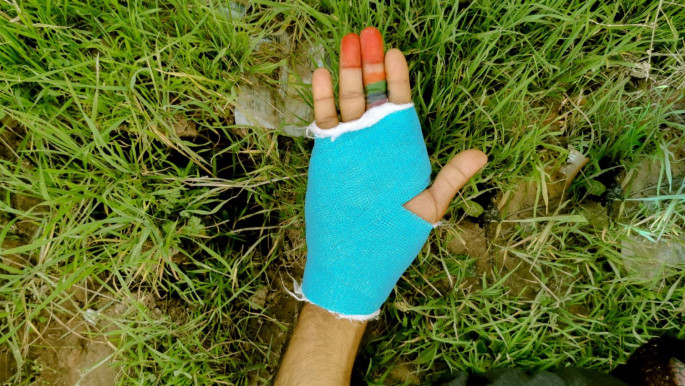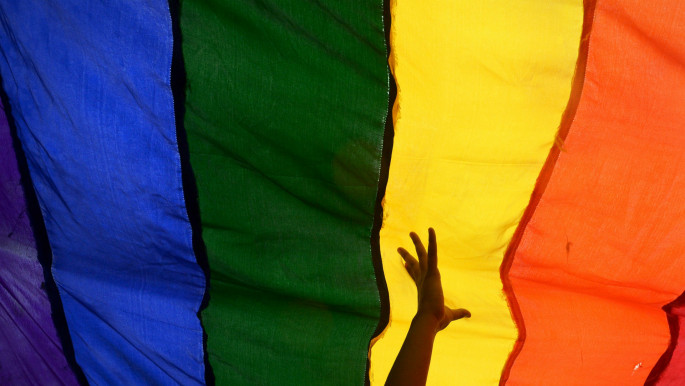Coronavirus: Lebanon's LGBT+ community is locked down and unprotected
More than half of the world's population is now living under lockdown in response to the Covid-19 pandemic, which has forced people to change the way they work, learn and socialise.
However in Lebanon, NGOs have warned that the stay-at-home measures introduced by the government a month ago pose serious risks to the safety of the LGBT+ community.
"If action is not taken to protect LGBT+ people during the lockdown, this could end up as a full-blown humanitarian crisis," Tarek Zeidan, the executive director of Helem, the first LGBT+ rights organisation in the Arab World, told The New Arab.
LGBT+ people in Lebanon, whose mere existence is already criminalised, often depend on community centres, tight social networks and dedicated NGOs for emotional and financial support.
"Now, they are totally disconnected from their community, which has worrying implications for security," LGBT+ activist Lea Zraika said. "Basic living is going to be very hard for many people."
Article 534 of Lebanon's penal code punishes "unnatural intercourse" with up to one year in prison and, despite not explicitly mentioning homosexuality, continues to be used by judges and security officials to detain and prosecute LGBT+ people.
 |
Stay-at-home measures introduced by the government a month ago pose serious risks to the safety of the LGBT+ community |  |
"Our societal structure here forces most people not to disclose their sexual orientation," said Dr. Chadi Ibrahim, a psychiatrist and clinical sexologist. "Most [LGBT+] people here live in concealment."
Nowhere to turn
As Lebanon's nearly seven million residents are confined to their homes under a government-enforced lockdown, Helem's hotline has seen an increase in calls from LGBT+ people reporting abuse or expressing suicidal thoughts.
"Most of the time families at home aren't the safest places for LGBT+ people," said George Azzi, who runs the Arab Foundation for Freedoms and Equality.
A 2013 Pew Research poll found that 80 percent of the Lebanese population reject homosexuality.
 |
|
| Read more: The LGBT activists on the frontline of Iraq's revolution |
"When you come out as LGBT+, often the first thing you lose is the support of your family or community," Azzi continued.
The cafes, schools, workplaces and bars that once acted as safe spaces for LGBT+ people are now off limits. Instead, they stay indoors.
But "it is very dangerous to be stuck at home when home is not the safest place to be," Ibrahim said.
One of Ibrahim's patients is a 16-year-old trans boy named Hadi* who has shaved his head and grown out his beard to create a more male appearance.
"He is under a lot of stress and verbal abuse from his father, who asks 'what would people say about my daughter'," Ibrahim said, explaining the pain caused by Hadi being misgendered.
He is showing severe anxious and depressive symptoms, Ibrahim said. For people like Hadi who are subjected to violence or abuse in their homes, there is no escape.
While cisgender (female-born and female-identifying) female survivors of domestic abuse have the opportunity to be placed in Lebanon's limited number of NGO-run safehouses, there are no such sanctuaries for LGBT+ people.
"Shelter has always been a problem for the trans community, but it has become an even bigger necessity with the coronavirus," Zreika said.
 |
When you come out as LGBT+, often the first thing you lose is the support of your family or community |  |
Furthermore, many LGBT+ abuse survivors have little recourse to justice or protection from the state, as they fear being arrested themselves because of their sexual or gender identity, Zeidan said.
Living on the margins
Lebanon is facing its worst economic crisis in decades, and a combination of price inflation, currency devaluation and tens of thousands of job losses has pushed vulnerable people, including LGBT+ individuals, further towards abject poverty.
Read more: The loneliness of being queer and Muslim
"The economic situation has affected everybody in Lebanon, but a lot of LGBT+ individuals do not have community support," Azzi said.
Months of economic hardship was only exacerbated by the outbreak of the coronavirus, which saw the government introduce a lockdown that limits opportunities to find work.
"Many employers are also taking the opportunity [of coronavirus-related closures] to lay people off," Zeidan said, adding that more and more LGBT+ individuals had been contacting Helem for support as they found themselves out of work.
According to research conducted by Helem, LGBT+ people already experience widespread discrimination and marginalisation in the labour market, including sexual harassment, blackmail, underpayment or being forced to work in return for sexual favours.
While the government has announced that it will be distributing cash payments of LL400,000 ($264) to families that are in need of emergency support during the lockdown, this will not cover the LGBT+ individuals living in near-destitution.
"The LGBT+ community is definitely not a priority for the government, so we have to do everything ourselves," Azzi said.
 |
A 2013 Pew Research poll found that 80 percent of the Lebanese population reject homosexuality |  |
Hundreds of LGBT+ people have contacted Helem asking for food and medical assistance in the month since the lockdown. The number of people registered to receive Helem's aid had doubled from 300 to 600 over the last six weeks.
"We are witnessing an incredibly sharp rise in malnutrition that wasn't there before," Zeidan said.
He is also concerned that people with specific medical needs, such as those living with HIV or transgender people undergoing hormone therapy, may not be able to access the care they need due to the lockdown.
Read more: In Lebanon's Covid-19, aid the vulnerable, including LGBT people
Zreika told The New Arab she had heard of trans individuals having to hide their hormone pills from unaccepting family members.
There are also fears of discrimination against LGBT+ people who are in need of healthcare services but cannot travel to centres that are accepting of the LGBT+ community.
 |
|
| Read more: MENA LGBT+ groups increase community support under coronavirus restrictions |
"Most health institutions are extremely homophobic and transphobic," Zeidan said, adding that trans people are "consistently" refused entry to healthcare centres.
Potential crackdown
Crackdowns on the LGBT+ population have increased in Lebanon in recent years, with pride events being cancelled, activists being detained by security agencies and the Lebanese indie band Mashrou' Leila being banned from playing in their own country because the lead singer is openly gay.
"The space for LGBT+ activism has been shrinking," Azzi said, warning that the increased security presence to enforce the lockdown and the government taking "emergency" measures could lead to a further oppression of LGBT+ rights and freedoms.
In his work on LGBT+ rights across the MENA region, Azzi has noted a "concerning trend where governments are using lockdowns as an opportunity to crack down on activists."
For Zeidan, once the pandemic eases and the government is left to face the fallout of economic stagnation, the needs of the LGBT+ community are likely to be further side-lined or repressed.
"We are not a tangential concern," Zeidan said. "It's time people paid attention."
*Not his real name.
Emily Lewis is a Beirut-based freelance journalist. She was formerly a reporter on the national desk of The Daily Star Lebanon
Follow her on Twitter: @EmCLew





 Follow the Middle East's top stories in English at The New Arab on Google News
Follow the Middle East's top stories in English at The New Arab on Google News


